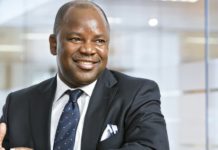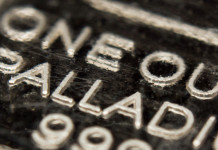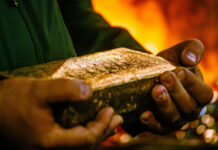
[miningmx.com] — HAS peace finally broken out between Brett Kebble and Mark Wellesley-Wood, CEOs of JCI and DRDGOLD respectively? That would seem to be the outcome of months of “on-off’ negotiations between the two, the point of which was to drop all legal claims and counter-claims against the other. We’ve heard rumours of entente before. This time it’s getting serious.
“I can’t comment at this point in time,’ said Kebble through a spokesman. Wellesley-Wood was equally reserved. Speaking from Sydney where he is visiting the company offices, Wellesley-Wood said: “No comment. There’s nothing I can say’. For two enemies who have fought by drumming up negative publicity against the other, this reluctance is uncharacteristic, eerie even.
A company source, however, had this to say: “Discussions are more on the up at the moment than on the way down. But the two men have agreed between themselves not to say anything to the press as it would be inopportune.
“The aim is a complete cessation of hostilities between the two at all levels. We’re on the cusp of achieving that, and something should be announced in a short space of time,’ he said.
If Kebble and Wellesley-Wood bury the axe it would be further good news, particularly for DRDGOLD which is enjoying a renaissance of late having disposed of its loss-making mines in the North West province (ironically retrieved from the liquidators by Brett’s father, Roger Kebble). Brett, too, is working hard to knock his house into shape.
Western Areas, of which he is also CEO, is hoping to derive positive cash flow from its South Deep investment, a mine on the west Rand. In addition, several investments, including a stake in Aflease Gold & Uranium Resources, have also been realised as Kebble attempts to bring as much cash to the centre as possible. He is still fighting a war of words against the “Scorpions’, South Africa’s special investigations unit, but that’s a separate matter.
There have been a series of legal contretemps between Kebble and Wellesley-Wood, so it’s been difficult to see what would be resolved. The flagship dispute is the claim of fraud against Roger Kebble following the purchase of the Rawas gold mine in Indonesia for R123m while Kebble was CEO of Durban Roodepoort Deep (DRD), as the company was then called. It’s not generally known, however, that this claim also extends to a number of other individuals including those employed at SG Securities at the time of the deal. John Stratton, an Australian businessman, and Charles Mostert, a former Durban Roodepoort Deep employee, are also rolled up in this imbroglio. The matter was even extended to the Western Australian Supreme Court.
So, presumably, settling with Brett also means settling with Roger Kebble? If so, this comes at a convenient time for Roger Kebble because he is hoping to reinvent DRDGOLD’s business model under the Simmers & Jack Mines banner. Simmers, as it is known, is also hoping to list offshore – probably North America – and would therefore probably have to disclose all legal matters against its directors in terms of stringent disclosures on liabilities against the Securities Regulation Panel. Better to do without this albatross then.
Taking disputes into the street, which is what happens when lawyers take them over, rarely works for either side. In the matter of Kebble and Wellesley-Wood, there really is no winner, other than the lawyers.
In explaining why DRDGOLD was taking lengthy legal action against the Kebbles, Wellesley-Wood said in a note to shareholders on October 2003, that ” … of course there’s the money – about $24m before interests and costs. We do not enter into litigation on spurious grounds’. One may conclude that it’s crucial for DRDGOLD to get something back. We shall see.











